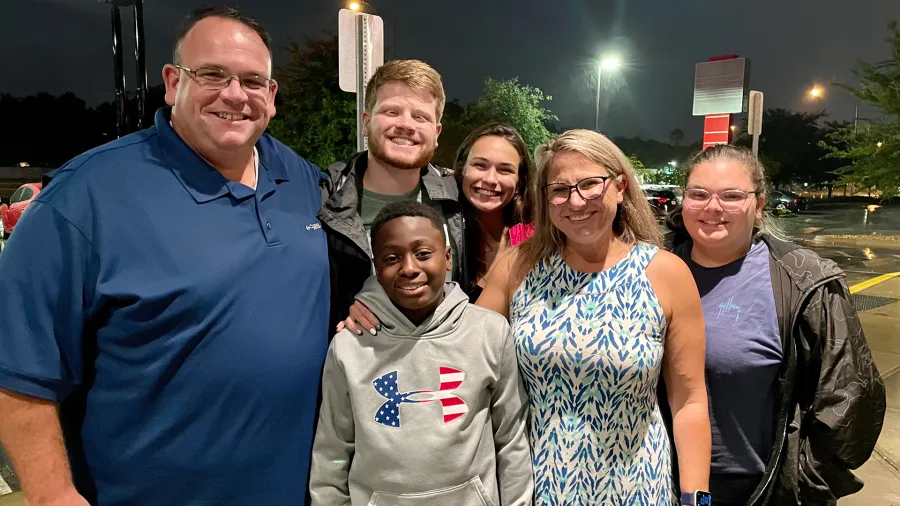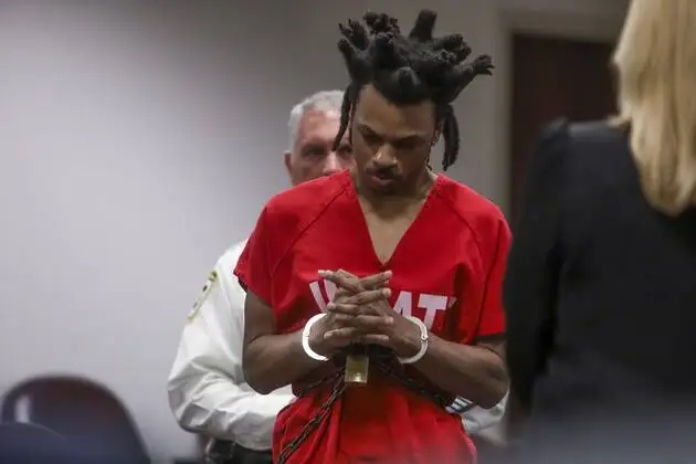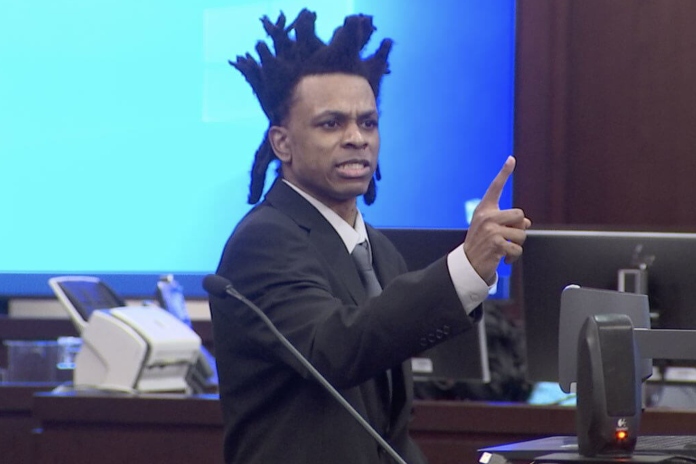The name Ronnie O’Neal III has become synonymous with one of the most shocking and disturbing crimes in recent memory. From the initial incident of fatally shooting his ex-girlfriend, 33-year-old Kenyatta Barron, hacking their 9-year-old daughter, Ron’Niveya O’Neal, to death with a hatchet, and stabbing their 8-year-old son Ronnie O’Neal IV, The heinous nature of O’Neal’s crimes left a trail of devastation and raised profound questions about the limits of human depravity.
The gripping courtroom drama that unfolded during his trial with the examination of the evidence witness testimonies, legal arguments, and the final verdict sheds light on the chilling events that transpired and the justice that was ultimately delivered. Join us as we delve into the dark depths of Ronnie O’Neal’s crimes and the pursuit of justice that followed.
Who Is Ronnie O’Neal?
Ronnie O’Neal III is an American man whose actions led to a devastating and tragic event within his community. In 2018, O’Neal brutally murdered his girlfriend, Kenyatta Barron, and their nine-year-old daughter then attempted to kill his eight-year-old son, who miraculously survived. He also set fire to their home during this horrifying incident.
The event shook the community to its core, bringing about profound sorrow and disbelief. O’Neal’s actions not only took the lives of two innocent individuals but also scarred the survivors and impacted the broader community deeply.
Following his arrest, O’Neal faced a trial that exposed the grim details of the murders and attempted murder. He represented himself in court, creating a distressing scene as he ranted and made erratic claims, including allegations of self-defense and government conspiracies.
Ultimately, the evidence against him was overwhelming, leading to his conviction on charges of first-degree murder, attempted murder, and arson. His actions not only destroyed lives but also resulted in his imprisonment as a convicted felon, leaving a lasting and tragic mark on the community.
How Old Is Ronnie O’Neal?
Ronnie O’Neal is 35 years old as of 2024. He was born on July 27, 1988, and his birth sign is Leo.
During his formative years, O’Neal attended a local elementary school before moving on to East Bay High School in Gibsonton, Florida. In high school, he found an outlet for his physical abilities by playing football. Sports provided him with discipline, teamwork, and a sense of belonging.
Where Is Ronnie O’Neal From?
Ronnie O’Neal is from Florida. He was born and raised in Florida, United States, and belongs to the African American ethnic group. He did not know his birth father and was raised by his stepfather, Billy Smith, until adulthood.
Another factor that points to the fact that he had a difficult childhood and upbringing was that he was sexually abused as a child, alongside his brother Alonso Kelley, when he was just five years old.
Ronnie O’Neal’s complex and diverse background surely shaped his journey through life. Growing up in a family that attended church and being a choir member, O’Neal had a strong spiritual foundation. His love for music led him to write songs and perform in a hip-hop duo, showcasing his creative talents.
Ronnie O’Neal Later Converted To Islam
Ronnie O’Neal may have been raised in a Christian home but he made a significant change in his life by converting to Islam later in life. This religious conversion reflects his journey of self-discovery and finding solace in a different belief system. It is a testament to his search for meaning and purpose.
He Joined The ROTC After High School
After graduating from high school, O’Neal took another path by joining the Reserve Officer Training Corps (ROTC), a college program that prepares young adults to become officers in the United States Military. This decision demonstrates his desire for structure, leadership, and a sense of duty towards his country.
Despite his aspirations to join the United States Marine Corps, O’Neal faced setbacks when he failed the entrance exam multiple times. These challenges highlight his resilience and determination as he continued to pursue his goals despite adversity.
He Held Several Jobs As An Adult
Throughout his adulthood, Ronnie O’Neal III held various jobs, including working in a gaming house and being a truck driver at one point. These experiences allowed him to gain skills, support himself financially, and navigate the realities of the working world.
In 2010, O’Neal became involved with Build Your Community (BYC), a local social work group. This organization focused on improving impoverished neighborhoods by mentoring the youth and providing training in boxing and hygiene.
O’Neal’s participation in BYC reflects his desire to give back to his community and make a positive impact on the lives of others. Notably, BYC also promoted peace, which aligns with O’Neal’s spiritual journey and desire for a harmonious society. This involvement showcases his commitment to social justice and community-building, even in the face of personal struggles.
What Did Ronnie O’Neal Do?
Ronnie O’Neal murdered his ex-girlfriend and their nine-year-old daughter. He also attempted to murder his then-eight-year-old son. Given his seemingly normal background and job history, few were prepared for the devastation that the now-convicted felon unleashed on his ex-girlfriend, children, and community at large.

The murders, now known as the Riverview murders, occurred on March 18, 2018. The series of events that led to the discovery of the murders began on the night of the aforementioned date. On that fateful day, the Hillsborough County Sheriff’s Office received a distress call at 11:43 p.m. EDT from an unidentified woman, now suspected to be Kenyatta.
In the background, a male voice was heard mentioning that he had been killed by her and urging an unknown person not to come outside but to call 911 immediately. Shortly after, the call ended.
Eight minutes later, another 911 call came in at 11:51 p.m., this time from a male alleging an assault by white demons, accusing Kenyatta (referred to as “Ke-Ke” in the call) of attempting to harm him and claiming to have just killed her. The caller, identified as Ronnie III, provided their home address.
Deputies arrived at the residence by 11:49 p.m., discovering Kenyatta unconscious in the yard. Before the fatal act, Ronnie III had shouted, “Come in here, kill this bitch!” In a tragic sequence of events, Ronnie III had also attacked his daughter Ron’Niveya with a hatchet, resulting in her death, and inflicted severe injuries on his son, Ronnie IV, by stabbing him.
He subsequently set fire to their home, but his injured son Ronnie IV managed to escape and informed authorities that his father had shot his mother before receiving urgent medical care.
While resisting arrest, Ronnie III was subdued by police using a Taser. While in custody, he referred to his deceased victim, Kenyatta, as the devil and remarked that the kids are the devil’s kids. He was incarcerated in Hillsborough County Jail the following day. Four days after the incident, on March 22, Ronnie IV provided detectives with his account of the tragic events that led to the deaths of his mother and sister on March 18.
Ronnie O’Neal III’s Trial, Evidence, and Sentence
The trial of Ronnie O’Neal III, after the monstrous slayings of his girlfriend and their 9-year-old daughter, garnered international attention for its high stakes and shocking details. After a three-week trial, the jury deliberated for a little over three hours and decided against imposing the death sentence.
Ronnie O’Neal III represented himself throughout most of the trial, which added to the overall uniqueness of the case. The trial lasted for three weeks, during which the jury heard testimonies from witnesses, including his son, a surviving child victim who recounted the horrifying events of the night his father murdered his mother and sister.
A Breakdown of Ronnie O’Neal’s Three-Week Trial
The trial of Ronnie III commenced on a summer day, June 16, 2021. Ronnie III, representing himself alongside legal counsel, confronted his son, Ronnie IV, as a witness for the prosecution.
In a tense exchange, Ronnie III questioned his son, who testified that his father had caused him harm during the incident, revealing that he had been stabbed. Initially, Ronnie III’s defense team attempted to argue self-defense under Florida’s stand-your-ground law. However, the judge dismissed this defense.
On June 21, 2021, Ronnie III was found guilty of multiple severe charges, like arson, first-degree murder, and aggravated child abuse. The severity of the crimes was reflected in the sentencing on July 23, 2021, when Ronnie III received three consecutive life sentences without parole plus an additional 90 years.
Judge Michelle Sisco, profoundly affected by the case, described it as the most harrowing in her nearly two-decade judicial career, emphasizing the abject cruelty shown toward Ronnie III’s daughter. Additionally, State Attorney Andrew Warren condemned the acts, describing them as among the most heinous and brutal witnessed in their community.
Where Is Ronnie O’Neal Now?
Ronnie O’Neal is currently serving his multiple sentences at the Blackwater River Correctional Facility in Milton, Santa Rosa County, Florida. On the other hand, his son Ronnie IV is doing just fine with his new family who appear to have welcomed him with open arms.

While the community was still dealing with the treacherous acts of his father, Detective Mike Blair, the detective who took care of Ronnie on the night of the murders, adopted Ronnie on November 25, 2019.
It has since become a heartwarming tale of love and care being extended to Ronnie IV, who found solace under Mike’s wing after a haunting night of tragedy. Ronnie IV, who is now known as Ronnie Blair, found a new home among a loving family of seven: Mike, his devoted wife Danyel, and their five children, aged between 16 and 23.
Reflecting on that fateful night, Detective Mike recalled the bleak odds stacked against Ronnie’s survival, deeming his recovery nothing short of a miraculous turn of events. Also, amid this newfound kinship, Ronnie expressed profound gratitude, affirming that he feels genuinely loved and embraced as an integral part of the Blair family.
Did Ronnie O’Neal III Suffer From Mental Illness?
Ronnie O’Neal possibly suffered from mental illness, a possibility that was brought up during his trial. During the trial, a forensic psychologist testified that O’Neal suffered from post-traumatic stress disorder (PTSD) and delusional disorder, suggesting that his mental health issues may have played a role in the heinous crime he committed.
While there was never conclusive evidence of mental illness, the shocking nature of his crimes, which garnered significant attention, and a closer examination of the facts, reveals a complex narrative involving childhood abuse, mental illness, and the impact of these factors on his actions.
Ronnie O’Neal May Have Had PTSD and Delusional Disorder
Few would argue against the possibility that Ronnie O’Neill had PTSD and delusional disorder. Post-traumatic stress disorder (PTSD) is a psychiatric condition that can develop after experiencing or witnessing a traumatic event like the abuse O’Neal endured as a child.
It is also a known fact that Individuals with PTSD often exhibit symptoms such as intrusive thoughts, nightmares, hyperarousal, and emotional numbing. In O’Neal’s case, the psychologist testified that his exposure to childhood abuse likely contributed to the development of this disorder.

The traumatic events O’Neal experienced may have triggered intense emotions, leading to mental distress and distorted perceptions of reality. Delusional disorder, on the other hand, is characterized by fixed, false beliefs that are not in line with cultural or social norms. These delusions can lead to significant impairment in daily functioning.
The forensic psychologist’s testimony suggests that O’Neal’s delusional disorder may have further clouded his judgment and contributed to his actions during the crime.
Ronnie O’Neal’s TV Documentary And Shows
Ronnie O’Neal’s shocking and tragic story has been the subject of several documentaries, TV shows, and podcasts including:
- The O’Neal Family Massacre by The Crime Atlas on YouTube.
- Ronnie O’Neal by Crime and Consequences
- Family Annihilator by True Crime Cases
- The Tragic Murders of Kenyatta Barron and Ron’Niveya O’Neal
The O’Neal Family Massacre by The Crime Atlas is one of the most chilling representations of what went down on March 18, 2018. It is available to stream on YouTube on The Crime Atlas page.
This documentary delves into the details of the murders committed by Ronnie O’Neal, exploring the events leading up to the crime and the aftermath. It examines the lives of those involved, including Ronnie O’Neal himself, his wife, and their children.
The documentary received significant attention from the public due to the disturbing nature of the crimes. It sparked discussions and debates about the motives behind the murders and the impact on the surviving family members. Viewers were captivated by the chilling details and the psychological aspects of the case.
In addition to documentaries, Ronnie O’Neal’s story has also been featured in various podcasts. One such podcast is “Ronnie O’Neal” by Crime and Consequences, which delves deeper into his background and the events leading up to the murders.
Another podcast, “Family Annihilator” by True Crime Cases, explores the psychology of family annihilators and provides insight into O’Neal’s mindset.
These documentaries and podcasts serve as a platform for raising awareness about the devastating consequences of domestic violence and the impact it has on families and communities.
By shedding light on these tragic events, they aim to educate the public and encourage discussions on important social issues.
Some Takeaways From Ronnie O’Neal’s Crime Story, Trial, And Sentence
The case of Ronnie O’Neal garnered significant media attention due to its shocking nature and the subsequent trial that unfolded. This in-depth analysis aims to examine the various teachable moments and takeaways that emerged from O’Neal’s crime story, trial, and eventual sentence.
The Impact of Domestic Violence:
O’Neal’s case brings to light the devastating consequences of domestic violence. His relationship with his girlfriend was marred by abuse, which reached its tragic climax with the brutal murders.
The case serves as a reminder of the urgent need to address and prevent domestic violence. It highlights the importance of early intervention and support systems for victims to prevent such catastrophic outcomes.
The Role of Mental Health:
Ronnie O’Neal’s mental health became a focal point during his trial. His erratic behavior, delusional claims, and refusal to cooperate with legal counsel raised questions about his mental state.
This case emphasizes the significance of proper mental health assessments and access to mental health care for individuals involved in criminal cases. It underscores the need for comprehensive evaluations to ensure a fair and just trial process.
Ultimately, the case of Ronnie O’Neal III serves as a reminder of the complex and multifaceted nature of mental illness and its potential impact on individuals’ lives.
By fostering understanding, compassion, and effective support systems, we can work towards a society that prioritizes mental health and prevents the escalation of tragic events.
Not Every Mentally Ill Person Commits Violent Crimes:
While it is crucial to recognize the presence of mental illness, it is equally important to understand that the vast majority of individuals with mental health conditions do not commit violent crimes.
However, one would also admit that in certain cases, mental illness can contribute to a person’s propensity for violence.
The forensic psychologist’s testimony suggests that O’Neal’s mental health issues, combined with his traumatic experiences, may have played a role in the commission of his heinous crime.
Mental Illness Can Affect Most Parts Of An Individual:
Mental illness can impact an individual’s cognitive functioning, emotional regulation, and impulse control, potentially altering their perception of reality and influencing their behavior.
O’Neal’s delusional disorder, characterized by fixed false beliefs, may have distorted his perception of the events leading up to and during the crime.
This distortion could have impaired his ability to make rational decisions and contributed to his violent actions.
Mental Illness Alone Does Not Excuse Criminal Behavior:
Additionally, it is essential to note that mental illness alone does not excuse criminal behavior. The legal system must consider a range of factors, including intent, motive, and personal responsibility.
While O’Neal’s mental health issues may have influenced his actions, it is crucial to ensure that justice is served by examining the totality of the circumstances.
The Complexity of Legal Defenses:
O’Neal’s case also highlights the complexities of legal defenses, particularly when dealing with individuals experiencing mental health issues.
His defense strategy included asserting his innocence, claiming self-defense, and representing himself in court.
This case serves as a reminder of the challenges faced by the justice system in balancing the rights of the accused with the need for a fair and impartial trial.
The Role of Forensic Evidence:
Forensic evidence played a crucial role in O’Neal’s trial. The presence of DNA, blood spatter patterns, and other physical evidence provided critical insights into the sequence of events.
This case underscores the importance of forensic science in criminal investigations and its role in ensuring justice. It also highlights the need for well-trained forensic experts and the utilization of advanced techniques to accurately analyze evidence.
The Power of Eyewitness Testimony:
Eyewitness testimony played a significant role in O’Neal’s trial. The child survivor of the attack provided a harrowing account of the events, which heavily influenced the jury’s decision.
However, this case also highlights the potential flaws and limitations of eyewitness testimony. It serves as a reminder of the need for caution and corroborating evidence to ensure the accuracy and reliability of eyewitness accounts.
The Challenges of Self-Representation:
O’Neal’s decision to represent himself in court presented numerous challenges. It showcased the risks associated with self-representation, particularly for individuals without legal training or experience.
This case serves as a reminder of the importance of competent legal counsel and the potential consequences of inadequate representation in the justice system.
Conclusion:
The case of Ronnie O’Neal stands as a tragic reminder of the consequences of domestic violence, the complexities of mental health in criminal cases, and the challenges faced by the justice system.
It emphasizes the need for early intervention, support systems, and mental health evaluations to address underlying issues. The case also underscores the importance of forensic evidence, the limitations of eyewitness testimony, and the risks of self-representation.
This analysis highlights the teachable moments and takeaways from O’Neal’s crime story, trial, and sentence, with the hope of fostering discussions and promoting positive change in the criminal justice system.


